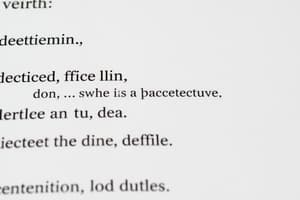Podcast
Questions and Answers
Which of the following is a pre-determiner?
Which of the following is a pre-determiner?
- Many
- First
- Half (correct)
- Third
Which of the following is a post-determiner?
Which of the following is a post-determiner?
- Next (correct)
- All
- Much
- Both
Which of the following pre-modifiers can occur before certain central determiners?
Which of the following pre-modifiers can occur before certain central determiners?
- Several
- Double (correct)
- One-third
- Many
Which of the following pre-modifiers can only be used with plural count nouns?
Which of the following pre-modifiers can only be used with plural count nouns?
Which of the following pre-modifiers can only be used with non-count nouns?
Which of the following pre-modifiers can only be used with non-count nouns?
Which of the following is a cardinal number?
Which of the following is a cardinal number?
Which of the following pre-modifiers are mutually exclusive?
Which of the following pre-modifiers are mutually exclusive?
Which of the following is a correct usage of 'some' as a quantifier?
Which of the following is a correct usage of 'some' as a quantifier?
Which of the following is a correct usage of 'any' as a quantifier?
Which of the following is a correct usage of 'any' as a quantifier?
Which of the following is an incorrect usage of 'some' as a quantifier?
Which of the following is an incorrect usage of 'some' as a quantifier?
Which of the following is an incorrect usage of 'any' as a quantifier?
Which of the following is an incorrect usage of 'any' as a quantifier?
Which of the following is a correct usage of '-some' as a quantifier?
Which of the following is a correct usage of '-some' as a quantifier?
Which of the following is a correct usage of 'any' as a quantifier?
Which of the following is a correct usage of 'any' as a quantifier?
Which of the following is an incorrect usage of '-some' as a quantifier?
Which of the following is an incorrect usage of '-some' as a quantifier?
Study Notes
Determiners and Quantifiers
- A pre-determiner is a word that comes before a central determiner and modifies its meaning.
- A post-determiner is a word that comes after a central determiner and provides additional information.
Pre-modifiers
- Certain pre-modifiers can occur before central determiners, such as "half", "double", and "twice".
- Some pre-modifiers can only be used with plural count nouns, for example "many", "few", and "several".
- Some pre-modifiers can only be used with non-count nouns, for example "much" and "little".
Cardinal Numbers
- A cardinal number is a number that expresses quantity, such as "one", "two", and "three".
Mutual Exclusivity
- Some pre-modifiers are mutually exclusive, meaning they cannot be used together, for example "all" and "both".
Quantifier Usage
- "Some" is used to indicate an unspecified quantity, and is often used in affirmative sentences.
- "Any" is used to indicate an unspecified quantity, and is often used in negative sentences or questions.
- Correct usage of "some": "I have some friends coming over tonight."
- Correct usage of "any": "Do you have any money?"
- Incorrect usage of "some": "Can I have some coffee? (asking for a specific quantity)"
- Incorrect usage of "any": "I have any money. (meaning 'some' or 'a certain amount')"
Suffix '-some'
- The suffix "-some" is used to form quantifiers, such as "any", "some", and "onesome".
- Correct usage of "-some": "I have somespace in my bag."
- Incorrect usage of "-some": "Can I have somemilk? (meaning 'some' or 'a certain amount')"
Studying That Suits You
Use AI to generate personalized quizzes and flashcards to suit your learning preferences.
Description
Test your knowledge on pre-modifiers in noun phrases with this quiz. Learn about pre-determiners, numerals, and quantifiers and how they modify nouns. Practice identifying pre-modifiers and improve your understanding of English grammar.




